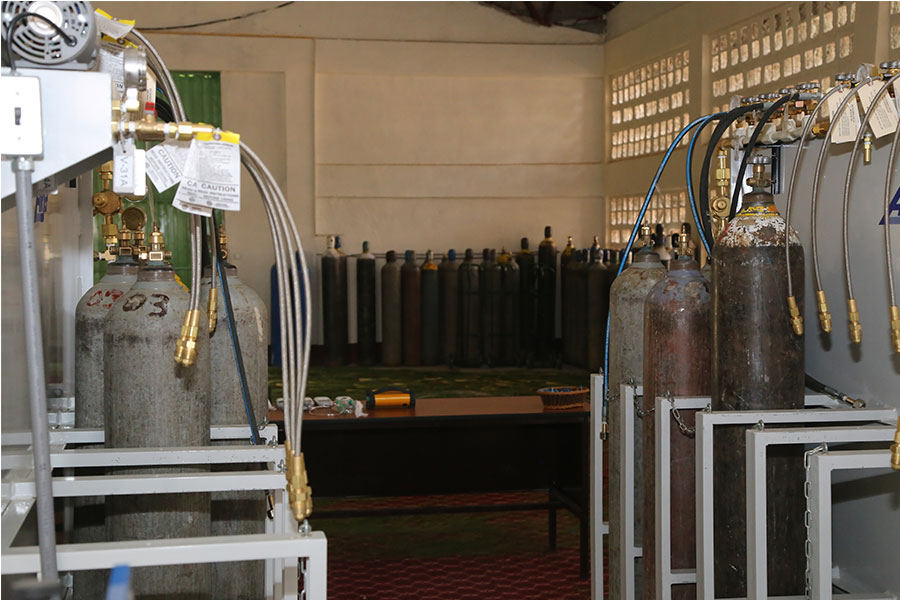
Radar | Oct 19,2019
Through the help of the World Bank, the federal government announced its plans to build a giant laboratory that will be used for clinical, diagnostic, teaching and research activities.
Expected to cost 27 million dollars, the Bio-Safety Level Three (BSL 3) Laboratory will be built by the Ministry of Health on the premises of the Ethiopian Public Health Institute (EPHI). The laboratory will be built with financing secured from the World Bank, which also conducted the project's feasibility study last year.
Part of the African Continent programme of the Africa CDC, an institution that helps African Union member nations improve their capacity for preventing disease outbreaks, the laboratory will rest on 10,000Sqm of land. It will have different complexes including eight laboratories, a laboratory equipment maintenance centre and a biobank, which will be used to manage highly viral diseases. It will also have administrative offices and research rooms.
The laboratory will handle clinical samples during outbreaks, which may be caused by high-risk pathogenic organisms. It is designed to create a safe environment for detection, identification, propagation and manipulation. Neighbouring countries, including Eritrea, Djibouti, Sudan and Somalia, will also use the laboratory.
Started a year ago, a bilateral discussion for the final agreement was held on October 10, 2019, between the Ministry of Finance, Health Ministry and the Institute. The World Bank's board is also expected to approve the project and the financing this coming December.
"The Institute has a shortage of capacity to test samples coming from all clinics and hospitals," said Ebba Abate (MD), director-general of EPHI.
EPHI provides services to prevent antimicrobial-resistant viruses that adapt to medicine and to prevent viral disease when they spread to the public throughout the country.
The country has 4,000 health centres, 400 hospitals and 2,000 laboratories. When EPHI gives services to 100 laboratories, it spends two million dollars for reagents and diagnosing, which is currently covered by the CDC and the World Health Organization.
It also gives laboratory services to hospitals and health centres across the country, charging 25 Br to 35 Br a sample test, which could take up to 24 hours.
When the laboratories of hospitals stop working due to a shortage of reagents, employees of the Institute collect samples from the hospital for the last three years, according to Ebba.
Under the regional project of Africa CDC, the laboratory is part of the Institute's objective to expand into the Centre of Excellence in the East African region. Africa CDC focuses on protecting and fighting diseases in African countries under the umbrella of the African Union.
The programme is currently building eight different laboratories in different parts of the country. The Global Fund, an international organisation that mobilises and invests more than four billion dollars a year to support programmes run by local experts in more than 100 countries, is financing the building of the laboratories. Regional states will equip the laboratories.
The laboratory will save time and foreign currency the country has been spending to send samples abroad for tests, according to Yirgu G.Hiwot (MD), director of clinical services at Addis Abeba University's Health College.
"It will also be instrumental in increasing the credibility of local laboratory tests," said the expert.
PUBLISHED ON
Oct 12,2019 [ VOL
20 , NO
1015]

Fortune News | Apr 06,2019

Fortune News | Jun 14,2020

Radar | Jun 27,2020

Radar | Jun 03,2023

Radar | May 03,2025

Dec 22 , 2024 . By TIZITA SHEWAFERAW
Charged with transforming colossal state-owned enterprises into modern and competitiv...

Aug 18 , 2024 . By AKSAH ITALO
Although predictable Yonas Zerihun's job in the ride-hailing service is not immune to...

Jul 28 , 2024 . By TIZITA SHEWAFERAW
Unhabitual, perhaps too many, Samuel Gebreyohannes, 38, used to occasionally enjoy a couple of beers at breakfast. However, he recently swit...

Jul 13 , 2024 . By AKSAH ITALO
Investors who rely on tractors, trucks, and field vehicles for commuting, transporting commodities, and f...

Nov 1 , 2025
The National Bank of Ethiopia (NBE) issued a statement two weeks ago that appeared to...

Oct 25 , 2025
The regulatory machinery is on overdrive. In only two years, no fewer than 35 new pro...

Oct 18 , 2025
The political establishment, notably the ruling party and its top brass, has become p...

Oct 11 , 2025
Ladislas Farago, a roving Associated Press (AP) correspondent, arrived in Ethiopia in...